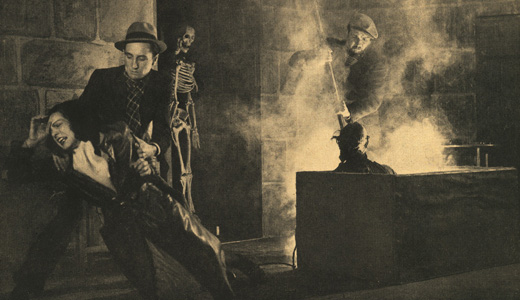 2014
2014
Titus Andronicus is one of Shakespeare's most gruesome plays, and a recent production at the Globe Theatre is proving too much for some audience members to handle. The show, which features graphic depictions of sexual assault, murder, and cannibalism, carries a warning of "grotesque violence," which hasn't been enough to prepare some theatregoers. The Telegraph reports:
A spokesman for the Globe confirmed five members of the audience fainted in a particularly gory five-minute scene, adding front of house staff are "very well trained to look after people". One theatregoer, who watched the show’s opening night, said there had been “quite a few droppers” in the audience, who fainted upon seeing so much blood. Another reported he had “almost puked” by the interval, while a third warned: “You will definitely need a strong stomach”.
 1949
1949
From its opening in the late 1890s, Paris' Grand Guignol specialized in the kind of naturalistic horror shows that made audiences gasp, scream, and faint. By the end of the second World War, though, the theatre's audiences had grown nerves of steel—for what, the Guignol's staff wondered, could be more horrifying than the last twenty years of real life? The New York Times reported on the Guignol's predicament (and its new direction):
Some of the spectators come to test their nerves. Others come because they “like that kind of stuff.” Next to a young man subtly masking his eyes during a painful scene there is likely to be a game old lady peering avidly at the stage through a pair of field glasses. Next to a nervous girl anxiously biting her tongue there is likely to be a steel-faced character mechanically chewing gum. “There is no predicting reactions,” says the manager of the theatre. “We've had doctors and medical students pass out while delicate ladies come through unscathed.” It is the director's theory that the spectator of 1949 is just as sensitive and shockable as the spectator of 1901, but that two gruesome wars have taught him how to grimace and take it on the chin. Mr. Spectator does not faint so often today, and there are fewer cases of hysterics. “They react, all right,” explains Grand Guginol's stage-manager who has been with the theatre since 1903, “but they've learned to cover their eyes and stop up their ears instead of passing out of breaking into screams. We're looking for a new twist. We're experimenting with psychological horror plays. That way, if we miss them at the theatre, we'll get them after the show when they reflect on the play before going to sleep.”